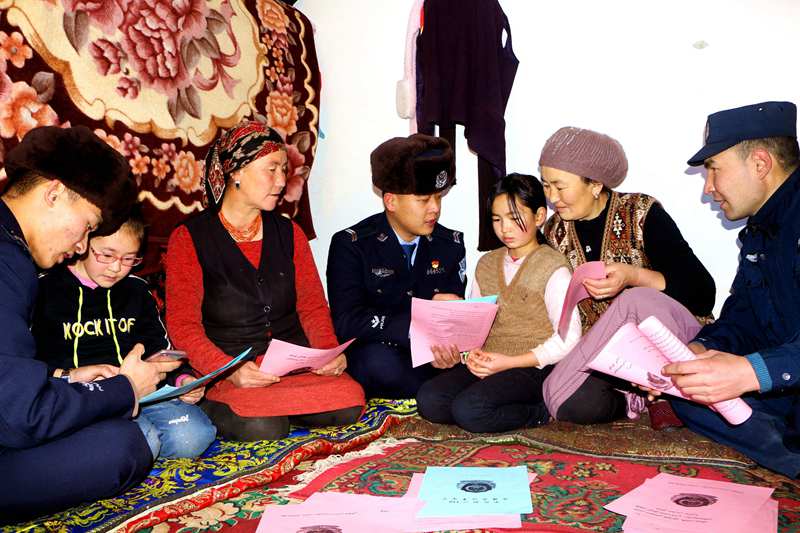

To compile the civil code is a major legislature task set by the Fourth Plenary Session of the 18th Central Committee of the Communist Party of China (CPC).

Students debate on a mock trial held in Yaohai district, Hefei, capital of east China’s Anhui province on June 16, 2019. Photo by Xiong Wei/People’s Daily Online
According to schedule, general rules of the civil code, which is dubbed as an “encyclopedia of social life,” will be made first, followed by detailed provisions.
Huang Wei, an official with the Legislative Affairs Commission of China’s National People’s Congress (NPC) Standing Committee, told the People’s Daily that legislative departments, conducting thorough and extensive research, have heard advice via multiple channels and constantly improved the draft version of the civil code since the compilation started in 2015.
To gather wisdom from the mass is a conspicuous characteristic of the compilation, Huang noted. She took the provisions on marriage and family as an example. Regarding the marriageable age, an issue that draws wide social attention, legislative departments have not only studied the opinions from different parties, but also conducted special surveys to solicit public opinions on desired marriageable age under the help from the National Bureau of Statistics, to further improve the rationality and accuracy of the legislative resolution.

Students from an elementary school in Pingli county, northwest China’s Shaanxi province talk to a robot at a legal education base, September 20, 2019. Photo by Shen Yijun/People’s Daily Online
Relevant drafts have all been published on the website of the NPC to solicit public opinions after being deliberated by the NPC Standing Committee. According to preliminary statistics, the Legislative Affairs Commission of the NPC Standing Committee has published seven times the drafts since August 2018, receiving 951,607 pieces of advice from 410,349 people. The advice and relevant problems have been studied by legislative departments, and highlighted during the revision process.
Legislation shall be fact-based and shall conform to social reality. According to Huang, legislative departments have gone to different regions multiple times for investigation, hearing advices from parties concerned on the drafts. During the drafting of the general rules and compilation of detailed provisions, these departments also went to various places for investigation and seminars. They visited residential communities, neighborhood committees, enterprises and universities to solicit opinions. Besides, they also established a coordinating group consisting staff from the Supreme People’s Court, the Supreme People’s Procuratorate, the Ministry of Justice, the Chinese Academy of Social Sciences and the China Law Society, convening conferences on a regular basis.

Police officers in Kizilsu Kyrgyz Autonomous Prefecture, northwest China’s Xinjiang Uygur Autonomous Region explain legal knowledge to local residents, January 1. Photo by Wu Mingxian/People’s Daily Online
How to improve the relevant regulations on high-rise littering is a hotspot issue during the compilation of the provisions on torts, Huang introduced, saying high-rise littering is a frequent problem that seriously endangers people’s lives and property. Legislative departments, based on the existing terms in the tort liability law, have thoroughly studied relevant legislation of foreign countries, held seminars for parties concerned, scholars, property management companies and residents, and have gone to places concerned for special investigation, Huang introduced. They finally improved relevant provisions and won high recognition.

 Award-winning photos show poverty reduction achievements in NE China's Jilin province
Award-winning photos show poverty reduction achievements in NE China's Jilin province People dance to greet advent of New Year in Ameiqituo Town, Guizhou
People dance to greet advent of New Year in Ameiqituo Town, Guizhou Fire brigade in Shanghai holds group wedding
Fire brigade in Shanghai holds group wedding Tourists enjoy ice sculptures in Datan Town, north China
Tourists enjoy ice sculptures in Datan Town, north China Sunset scenery of Dayan Pagoda in Xi'an
Sunset scenery of Dayan Pagoda in Xi'an Tourists have fun at scenic spot in Nanlong Town, NW China
Tourists have fun at scenic spot in Nanlong Town, NW China Harbin attracts tourists by making best use of ice in winter
Harbin attracts tourists by making best use of ice in winter In pics: FIS Alpine Ski Women's World Cup Slalom
In pics: FIS Alpine Ski Women's World Cup Slalom Black-necked cranes rest at reservoir in Lhunzhub County, Lhasa
Black-necked cranes rest at reservoir in Lhunzhub County, Lhasa China's FAST telescope will be available to foreign scientists in April
China's FAST telescope will be available to foreign scientists in April